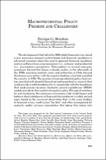| dc.contributor.author | Mendoza, Enrique G. | |
| dc.coverage.spatial | CHILE | es_ES |
| dc.date.accessioned | 2019-11-01T00:08:09Z | |
| dc.date.available | 2019-11-01T00:08:09Z | |
| dc.date.issued | 2018 | |
| dc.identifier.isbn | 978-956-7421-58-9 | |
| dc.identifier.uri | https://hdl.handle.net/20.500.12580/3862 | |
| dc.description | The developments that led to the 2008 global financial crisis raised a new awareness amongst central banks and financial regulators in advanced economies about the need to approach financial regulation and surveillance from a macroeconomic (i.e. systemic) and prudential (i.e. pre-emptive) perspective. Policymakers in several emerging economies learned this lesson a decade earlier in the aftermath of the 1990s emerging markets crises and authorities in Chile learned this lesson even earlier with the massive banking crisis that engulfed the country in 1982. The practice of macroprudential policy however has marched well ahead of theoretical and quantitative research that could provide a solid foundation for it comparable with the foundation that neokeynesian dynamic stochastic general equilibrium (DSGE) models provide for the conduct of monetary policy. | |
| dc.format | .pdf | |
| dc.format.extent | Sección o Parte de un Documento | |
| dc.format.medium | p. 225-277 | |
| dc.language.iso | eng | |
| dc.publisher | Banco Central de Chile | |
| dc.relation.ispartof | Series on Central Banking Analysis and Economic Policies no. 25 | |
| dc.rights | Attribution-NonCommercial-NoDerivs 3.0 Chile | * |
| dc.rights.uri | http://creativecommons.org/licenses/by-nc-nd/3.0/cl/ | * |
| dc.subject | CRISIS FINANCIERA | es_ES |
| dc.subject | CRISIS ECONÓMICA 2008 | es_ES |
| dc.subject | BANCOS CENTRALES | es_ES |
| dc.subject | POLÍTICA MONETARIA | es_ES |
| dc.subject | MODELOS ESTOCÁSTICOS | es_ES |
| dc.title | Macroprudential policy: promise and challenges | |
| dc.type.doc | Artículo | |
| dc.file.name | BCCh-sbc-v25-p225_277 | |


